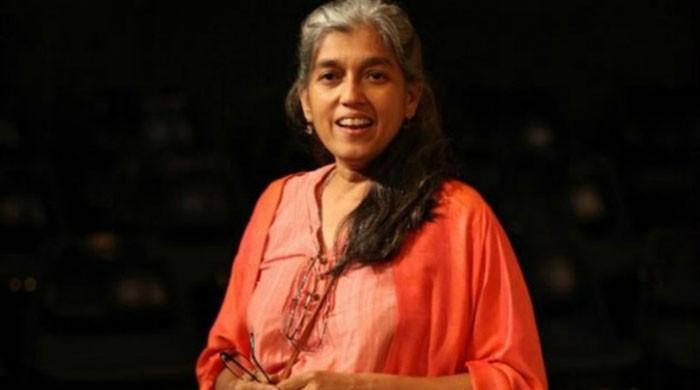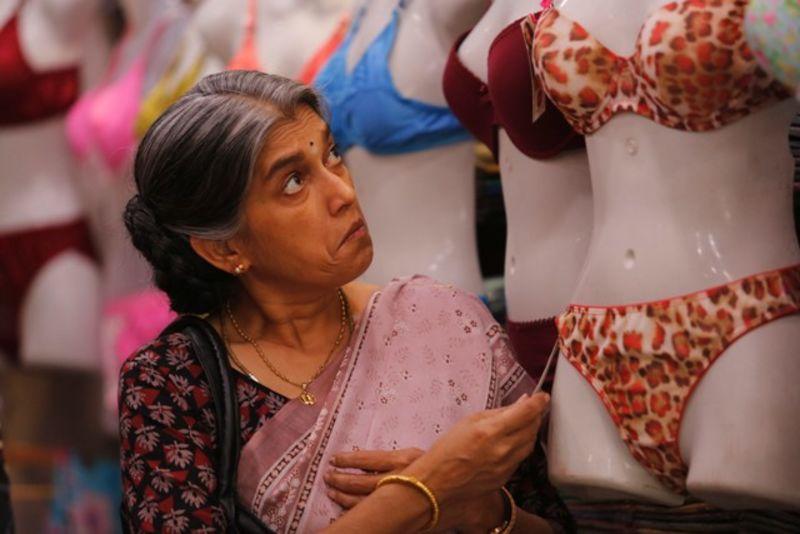

Variety is key for Ratna Pathak Shah. The veteran theatre actress has made her presence felt in Bollywood, television comedies, and indie cinema — even directing plays for her theatre group.
The 60-year-old actress has two films opening in cinemas in July. The first is "Lipstick Under My Burkha", an indie film about four women dealing with life in a conservative society. The other is slapstick comedy "Mubarakan" in which Shah plays the matriarch of a wealthy business family.
Shah spoke to Reuters about balancing commercial Bollywood films and indie cinema, the role of art and artists in times of strife, and why being a director's actor is not a good thing.
Q: In "Lipstick Under My Burkha", you play a woman in her 50s who has to hide her sexual awakening from her family. How did you interpret this character?
A: My initial response to the role was - here's an extremely unusual part for a woman my age. I am not going to get too many such options. A script that was well-written, a director who seems to know what she is doing and a part that is really unusual. But more than that, the character intrigued me. At the beginning of any project, you don't really know where this character will lead you. Over a period of time, reading it over and over, interacting with other [actors] and finally shooting it, it crystallizes. It is a character that has probably never been seen before. I can say this confidently. There was some fear also, because it is difficult to play scenes like this. I was also concerned about what people would say - not my immediate family, but my extended family.
Q: Do you still think of what your family will think when accepting roles in films?
A: Partly, yes. It is not enough to stop me from doing anything, but it is a thought that crops up. But having seen the film, I would want my uncles and aunts to watch it. Because it is not offensive. It offends where it is meant to offend. It shakes up preconceived notions and if a society has to move forward, we must do that. Otherwise, we will end up like Daesh. We will move backwards, towards medieval ideas. A hundred years after the dawn of modern civilization, the very idea of it is being threatened, not just in our country, but all over the world. We are going to get into the really ugly part of it now … If we can get this movie out to a wide audience, then we are helping our society move in a direction that is required for the stresses and strains of modern life. I mean, artificial intelligence is around the corner and with a population like ours, what will it do to people? Before you know it, the Nazi idea will become acceptable. 'Get rid of the ones you don't want'. Dangerous.
Q: Do you think our art and artists are standing up to be counted in these dangerous times?
A: I think so. Maybe not popular art as much as it should be. Popular art is a money-making venture, finally. When money is your focus, your whole approach to your work changes. If telling a story is what the artist is interested in, then they will have to find different ways to approach their work. We are bursting with stories in our country today, and we are finding people who are making them today. Even if it's five-minute stories or three-minute stories. But in this rush to make everyone's voice heard, what will be the quality of these stories, how sustainable it will be, I don't know and I cannot predict. But the churn is there, the manthan (churn) has begun. And I don't think we are going to be able to put a lid on it so easily.
Q: Doesn't popular art have some responsibility though? You have been part of mainstream films that have had something to say.
A: Not all of them, I am afraid. (laughs). But let us not name names. But yes, it should be much better. Even if I want to make an adventure film with 20 songs. But at least I should shoot those 20 songs in an interesting manner. And even if it is laugh-a-minute, I should at least write a good script - not this crude, Govinda kind of stuff that we have been putting up with.
Today, with the internet and the wide accessibility of variety in what people are consuming, there are going to be directors who want to tell different stories. Men and women. Because the whole process of film-making has become easier, cheaper and more democratic. But these things are always one step ahead, five steps back. But either we keep crying about those five steps or choose to cheer that one step forward and build on that.
Q: Is that frustrating as an actor?
A: Of course it is. It is incredibly frustrating.
Q: How do you cope with it?
A: Like you cope with other frustrations in life. You throw things around, you beat your head against the wall and then tell yourself "I have to do this.' … Focus on the paycheck at the end of day. Everyone goes through that. All professions have that. You don't always get the good things, no? 80 percent of the time it's gadhamajoori (drudgery). But the problem with young people these days is that they want 80 percent of great stuff.
That is exactly what has happened with me. I have spent the best years of my life waiting for things to happen, not being proactive enough maybe. Particularly as an actress, my growth has been so slow and so painful. I don't think I knew how to act with any confidence over my abilities. I was blundering along.
Q: Were you plagued by self-doubt?
A: No, it was not self-doubt. I could see what I was doing and I could see that it was wrong. But I didn't have the skills to correct myself. It took me a long time to develop those skills. That is why I like to talk about it with younger actors because I would like to see someone else short-circuit that process. Mainly, the big mistake we all make is to focus on the trappings, on the fallout of your work. Will I get another film? Will I get money? You are building on this to get somewhere else, whereas this is where you should be focused on.
For actors, I really feel, speech and the use of the body are two areas which are neglected tremendously in our country. There are no speech teachers anymore. Dramatic speech is not to do with diction alone - sometimes you deliberately spoil your diction to make an impact. The point is, how do you make dialogue sound like a conversation? There are others who don't give as much importance to speech, but I do. Because it has given me a way to get into a role.
And I read the "Mubarakan" script as many times as I read the "Lipstick Under My Burkha" script. Because whatever it is, the writer is trying to make a point. And can I help them make that point? Can I communicate that with beauty and intelligence? Focus on the process of how to do it and learn the process. Don't wait for your director to tell you what to do. A lot of people do that. 'I am a blank slate. I am a director's actor'. The director has three thousand other things to think about. Bring something to the table. If you come as a lump of lard, what will your poor director do?
No comments:
Post a Comment